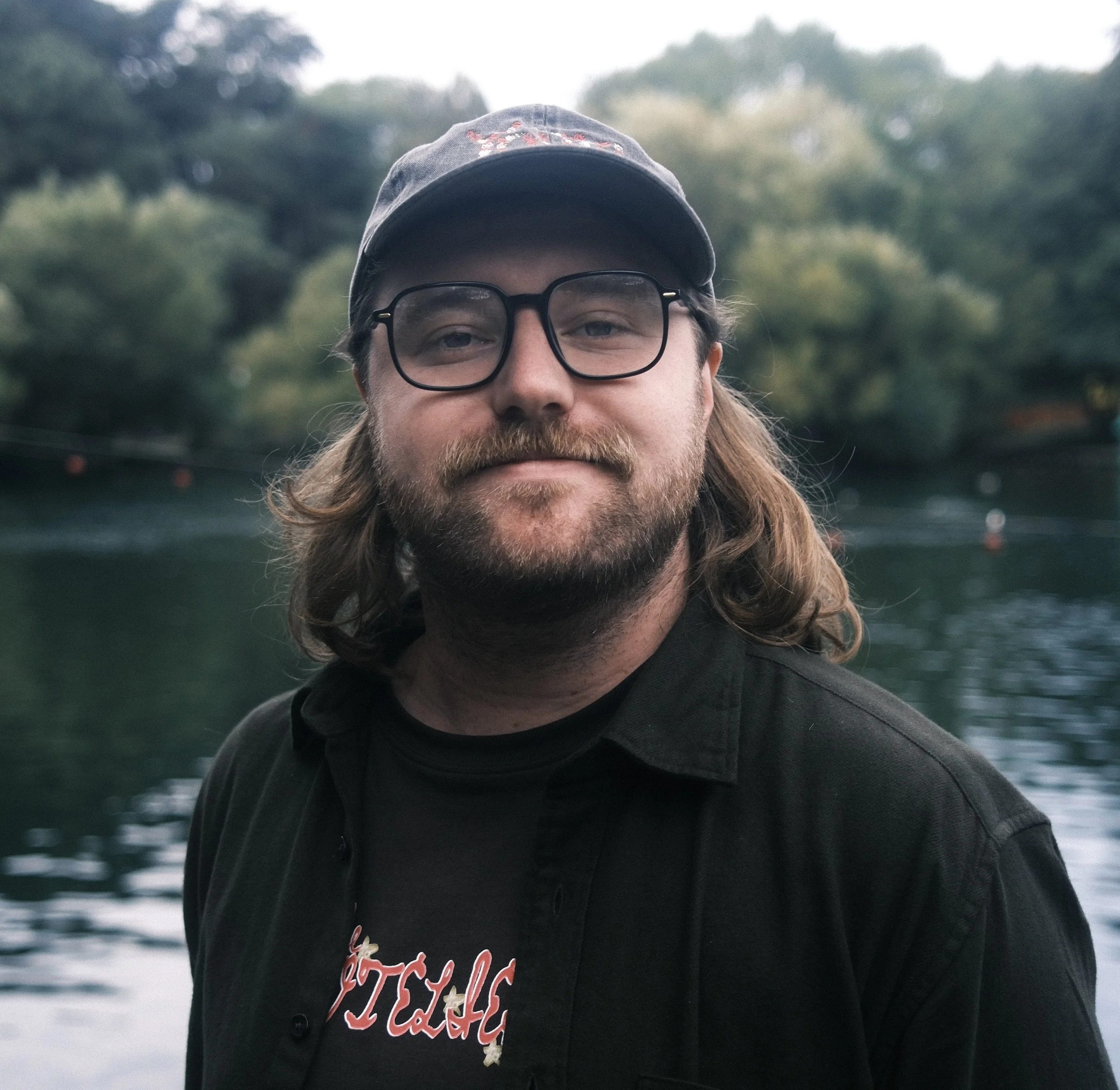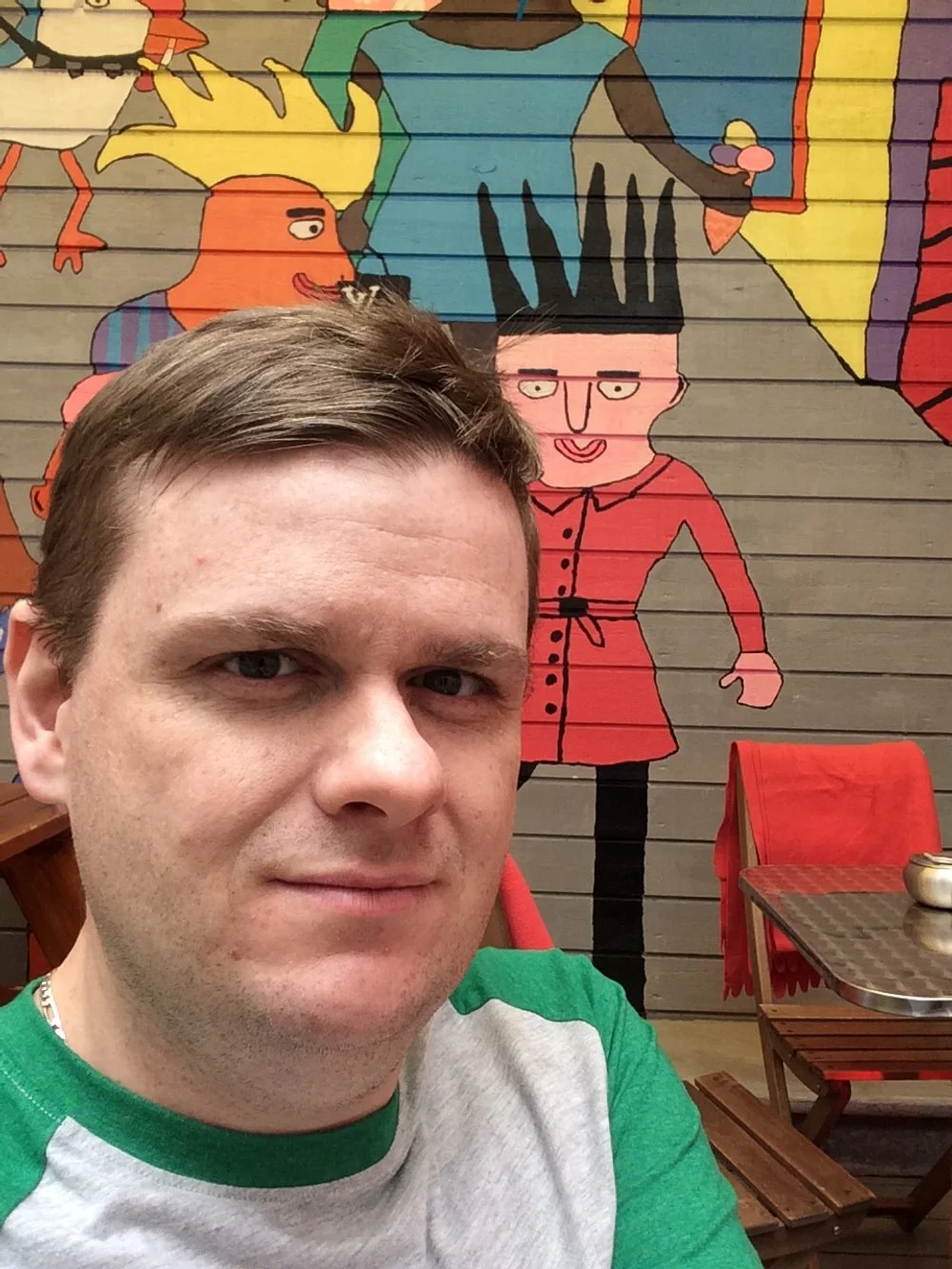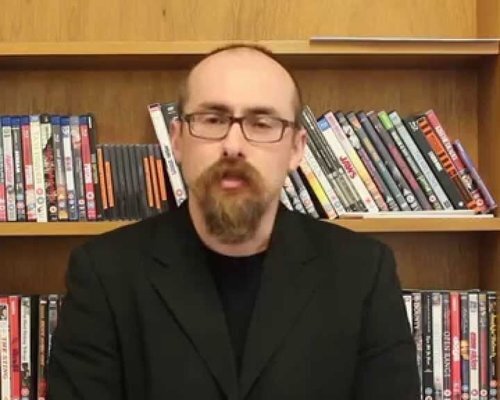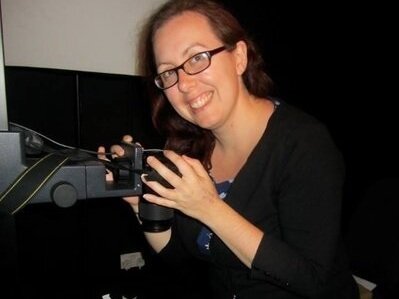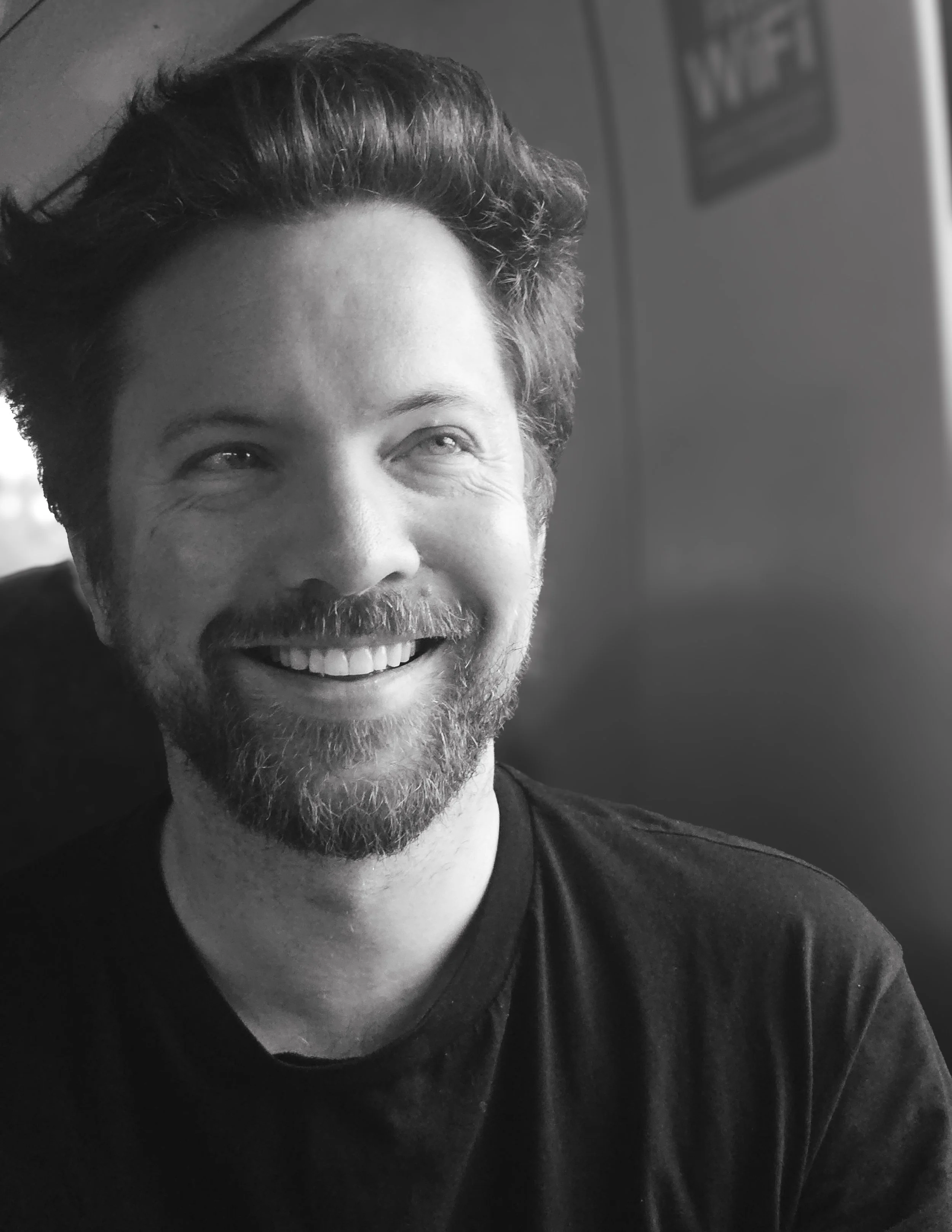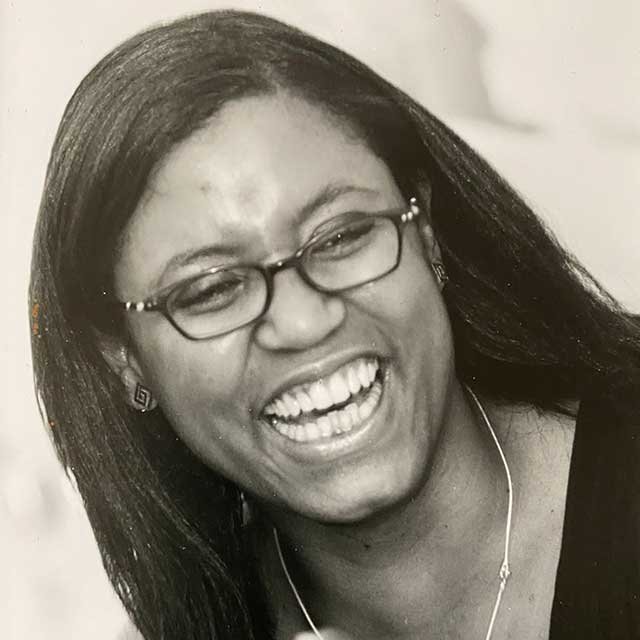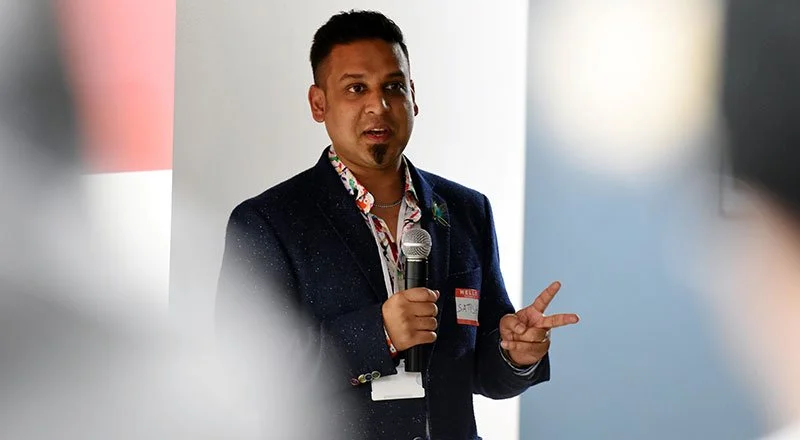Staff
The Manchester Metropolitan Game Centre brings together academics and practitioners from a range of disciplines, including Education, English, Games Design, History, Media Studies, Psychology, Science Communication, and Sociology. The MGC is based in the Departments of English and History is headed by Jennifer Cromwell, Chloé Germaine and Paul Wake.
Dr Cem Abanazir
Dr Cem Abanazir is a Lecturer in Law at Manchester Law School, Manchester Metropolitan University. He is a Turkey-qualified lawyer (non-practising) with experience in the sport industry. Cem has published on esports’ philosophical, legal, and governance dimensions, as well as its interactions with the Olympic Movement.
Select Publications
Abanazir, C., Shinohara, T. (2025) 'Esports Law and Esports Governance.' in Jenny, S.E., Besombes, N., Brock, T., Cote, A.C., Scholz, T.M. (ed.) Routledge Handbook of Esports. London: Routledge, pp. 482-492.
Abanazir, C. (2024) ‘Law and Governance in a Complex Esports Society.’ in Jenny, S.E, Besombes, N, Brock, T, Cote, T, and Scholz, T.M (eds), Routledge Handbook of Esports. London: Routledge.
Abanazir, C. (2023) ‘The Olympic Movement and Esports Governance: Finding the Right Way of Cooperating for Diversity, Equity and Inclusion.’ in Tjønndal, A (ed), Social issues in Esports. Abingdon: Routledge.
Abanazir, C. (2021) ‘Of values and commercialisation: an exploration of esports’ place within the Olympic Movement’, Sport, Ethics, and Philosophy. Vol. 16:4, pp. 397-412.
Abanazir, C. (2019) ‘E-sport and the EU: the view from the English Bridge Union’, The International Sports Law Journal. Vol. 18:3-4, pp. 102-113.
Abanazir, C. (2019) ‘Institutionalisation in E-Sports’, Sport, Ethics, and Philosophy. Vol. 13:2, pp. 117-131.
Dr Gabriele Aroni
Dr Gabriele Aroni is a Senior Lecturer in Game Arts at the School of Digital Arts of Manchester Metropolitan University. With a background in architecture and digital media, his research is situated at the intersection of architecture, game studies, cultural heritage, and semiotics. His publications space from architectural history and semiotics, to the aesthetics of digital games and copyright law.
Select Publications
Aroni, G. (2025). ‘Cultural Heritage and Chinese Digital Games’. Youth and Globalization, (6)1-2, pp. 166-189.
Aroni, G. (2023). ‘From Bricks to Pixels’. in Petrilli, S., & Meng Ji (eds) Intersemiotic Perspectives on Emotions. London: Routledge, pp. 227-240.
Aroni, G. (2023). ‘Games as Authorial Platforms? An Exploration of the Legal Status of User-created Content from Digital Games’. International Journal for the Semiotics of Law.
Aroni, G. (2022). ‘A Missile to the Face: Scarred Character in Mass Effect 2’. In Gaming Disability, edited by Katie Ellis, Mike Kent, and Tama Leaver, 81-91. Routledge Research in Disability and Media Studies. London: Routledge.
Aroni, G. (2022). The Semiotics of Architecture in Video Games. London: Bloomsbury Academic.
Aroni, G. (2019). ‘The Architecture of Assassin’s Creed II’s Florence’. Well Played (8)1, pp. 13-26.
Damon Bannister
Damon Bannister is a Lecturer in Animation at the School of Digital Arts (SODA) with a background in 3D animation, compositing and visual effects. His work explores the use of stationary objects for sequential storytelling, and ergodic narratives within transmedia and audio/visual contexts (including current ongoing research project Dead Already, a multidisciplinary arts and storytelling project in collaboration with SODA colleagues). His primary research project is Metahuman to Stop Motion, in which he is investigating how Epic Games’ Metahumans can be used alongside 3D printing to allow for motion captured performances to be utilised within stop-motion animation.
Dr Benjamin Bowman
Dr Ben Bowman is a Lecturer in Youth Justice. He uses creative methods including games, video games, board games and role-play to explore young people’s visions of climate justice. Right now, the world is experiencing so many crises of justice, injustice, harm and hardship and Ben uses games to help young people share and nurture each other’s visions of the worlds they would like to see. In teaching, he uses creative simulations to help students explore everything from international relations to labour disputes. Ben has led play, gaming and simulation activities outside of the University too, including for Woodcraft Folk, Quakers in Britain and the European Youth Forum.
Dr Tom Brock
Dr Tom Brock is a Senior Lecturer in the Department of Sociology at Manchester Metropolitan University. His research interests include play, games and social theory. He has authored publications on esports, player skill, failure, player labour and digital games consumption in peer-reviewed journals including, Games and Culture, Journal of Consumer Culture, and Information, Communication and Society. He was a member of DiGRA’s executive board (2018-2021) and is currently the Deputy Chief Editor of International Journal of Esports and a member of the editorial board of Journal of Electronic Gaming and Esports and Journal of Gaming and Virtual Worlds. Tom is currently co-editing a Special Issue on ‘Digital Transformations in Gaming and Gambling’ for the Journal of Consumer Culture.
Select Publications
Brock, T., Crawford, G. (2024). ‘Just Fun and Games? A Sociological Consideration of Fun in Video Games.’ Games and Culture 0(0).
(2024) Jenny, S. E., Bescombes, N., Brock, T., Cote, A. C., Scholz, T. M., (Eds) Routledge Handbook of Esports. London: Routledge.
Brock, T., (2022). ‘How to do Phenomenology in Game Studies.’ Doing Research Online, London: Sage.
Brock, T., (2022). ‘NFTs in Games and the Future of Work and Leisure.’ 22 March 2022. Digital Planet Podcast, BBC World Service.
Brock, T., (2022). ‘Game Studios are Turning Play into Work.’ 13 Jan 2022, Wired.
Brock, T., (2021). Counting Clicks: Esports, Neoliberalism, and the Affective Power of Gameplay Metrics. In Dal Yong Jin. (Ed.) Global Esports: Transformations of Cultural Perceptions of Competitive Gaming. Bloomsbury Academic.
Brock, T., MR. Johnson (2021). Video gaming as craft consumption. Journal of Consumer Culture 0(0), pp. 1-17.
Brock, T., M. Johnson (2021). The gamblification of digital games. Journal of Consumer Culture 21(1), pp.3-13.
Brock, T., E. Fraser (2018). Is computer gaming a craft? Prehension, practice, and puzzle-solving in gaming labour. Information, Communication & Society 21(9), pp.1219-1233.
Brock, T., (2017). ‘Roger Caillois and E-Sports: On the Problems of Treating Play as Work.’ Games and Culture 12(4), pp. 321-339.
Brock, T. (2017). Videogame consumption: The apophatic dimension. Journal of Consumer Culture 17(2), pp. 167-183.
Gary Buller
Gary Buller is a Technical Specialist at Manchester Metropolitan University’s PrintCity, where he delivers workshops and training in additive manufacturing across disciplines including engineering, architecture, fashion, and digital arts. His teaching focuses on practical 3D printing skills and design-for-additive principles, informed by international experience in Europe and Asia. Passionate about bridging the skills gap in advanced manufacturing, Gary combines technical expertise with creative insight—and is also a published author of horror fiction and has featured in collections and magazines with Ramsey Cambell and Owen King.
Kirsty Bunting
Dr Kirsty Bunting has been a Senior Lecturer in English at Man Met Uni since 2009. She has published widely on the topic of collaborative literary networks and methodologies, especially those of late-nineteenth century authors. Kirsty writes bestselling commercial romantic fiction (as Kiley Dunbar) for publishers Hera Canelo, Audible and Saga Egmont, and was shortlisted for the RNA Romantic Comedy Novel Award 2021. Her latest research focuses on co-authored romantic fiction, interactive romantic fiction/gamebooks and romantic games. She runs the #LoveWritingMCR events series with Manchester Writing School colleagues.
Adam Cain
Adam Cain is a Lecturer in Games Art at Manchester Metropolitan University’s School of Digital Arts, and is currently responsible for leading the Concept Art unit, Life Drawing workshops, and supporting various other units across SODA. Adam has been involved in the development of several successful Games Art courses at various levels across the UK. He is passionate about all forms of interdisciplinary creativity and design. He specialises in digital illustration and concept art, but is also interested in exploring the relationship between art and games in wider contexts such as narrative, identity and memory.
Dr Matthew Carter
Dr Matthew Carter is a Senior Lecturer in Film in the Department of English, researching Western, Science Fiction, and Horror in films, and the cross-over with games.
Mick Chesterman
Mick Chesterman is a tutor in the Manchester Met Faculty of Education. His current passion is teaching and researching diverse forms of digital and physical making. This involves digital game making and building arcade machines, physical computing and anything to do with the web and media making. Whenever possible he brings in elements of play, social justice and thinking in systems. His PhD in Education (ESRI) at Manchester Met is focused on game making with families. Game Design Patterns are a particular area of interest, firstly in leveraging the broad recognition of game patterns and secondly tapping the value design patterns as a way into learning coding. Mick’s background in teaching is broad, involving over 25 years of community based education in languages, community development, media and technology. Since the very early days of the Web, he has been an advocate of using technology to help the aims of community and campaign groups. Much of his work has been about creating accessible learning resources for tech tools culminating in the coordination the FLOSS Manuals project, promoting Free Manuals for Free Software. After doing a Computing MSc and PGCE, he currently works at Manchester Met as a tutor in the school of Childhood, Youth and Education Studies.
Select Publications
Chesterman, M. (2023). ‘Game Making and Coding Fluency in a Primary Computing Context', in Keane, T., Fluck, A. E. (eds) Teaching Coding in K-12 Schools. pp. 171-187.
Chesterman, M. (2015). Quacking Javascript - Webmaking using Javascript to promote student engagement and constructivist learning approaches at KS3. M Chesterman, Manchester Metropolitan University.
Dr Jennifer Cromwell
Dr Jenny Cromwell is a Reader in Ancient History at Manchester Metropolitan University and co-director of the Manchester Games Centre. She is primarily interested in how Ancient Egypt is presented in games, both analogue and digital, as well as in archaeogaming more broadly. Additionally, she is also interested in games as a creative research method, including how tabletop roleplaying games can be used to explore aspects of world history, through her involvement in ‘Dice on the Nile’ and the development of such games set in ancient Egypt.
Game Studies Publications
Cromwell, J., ed. (2026) Ancient Egypt in Video Games. De Gruyter.
Cromwell, J. (2026) ‘Ancient Egypt in Video Games,’ in Ancient Egypt in Video Games, ed. J. Cromwell, 1–18. De Gruyter.
Cromwell, J. (2026), ‘Sekhmet’s Turn: The Uses of Ancient Egypt in the 2D Fighting Game Skullgirls,’ in Ancient Egypt in Video Games, ed. J. Cromwell, 313–335. De Gruyter.
Cromwell, J. (2022). ‘From Pyramids to Obscure Gods: The Creation of an Egyptian World in Persona 5,” thersites: Journal for Transcultural Presences and Diachronic Identities from Antiquity to Date 14: 1–42
Cromwell, J. (in print). ‘Ancient Egypt in Board Games,’ submitted to Proceedings of the 13th International Congress of Egyptologists.
Cromwell, J. (in print). ‘Seen But Not Played: Children in Ancient Historical Video Games,’ Videogames and History, ed. K. Cook et al.
Cromwell, J. (under review). ‘Playing Cleopatra in Board Games,’ submitted to Brill’s Companion to Cleopatra, ed. A. Peer. Brill.
Cromwell, J., Hayes, E., Ochała, G., and Scheerlinck, E. (under review). ‘Creating Historical Characters in a Fantasy Ruleset,’ submitted to Tabletop Gaming and the Medieval Past: Reception and Adaption, ed. T. Gobbitt. Brill.
Book Reviews
Cromwell, J. (2020), ‘Review of: Christian Rollinger (ed.), Classical Antiquity in Video Games: Playing with the Ancient Past’
Cromwell, J. (2021), ‘Review of: Ross Claire, Ancient Greece and Rome in Videogames: Representation, Play, Transmedia’
Cromwell, J. (2022), ‘Review of: Alexander von Lünen et al. (eds.), Historia Ludens: The Playing Historian’
Cromwell, J. (2022), ‘Review of: Jane Draycott (ed.), Women in Historical and Archaeological View Games’
Cromwell, J. (2022), ‘Review of: Michal Mochocki, Role-Play as a Heritage Practice: Historical Larp, Tabletop RPG and Reenactment'‘
Cromwell, J. (2024), ‘Review of: Jane Draycott and Kate Cook (eds.), Women in Classical Video Games’
Dr Matthew Crossley
Dr Matthew Crossley is a Senior Lecturer at MMU. He researches nature-inspired algorithms, and how they lend themselves to the automation of games.
Select Publications
Lloyd, H., M. Crossley, M. Sinclair, M. Amos (2021). J-POP: Japanese Puzzles as Optimization Problems. IEEE Transactions on Games. pp. 1-1.
Carolan, K. J. Verran, M. Amos, M. Crossley, J. Redfern, et al. (2019). SimFection: a digital resource for vaccination education. Journal of Biological Education 53(2), pp.225-234.
Verran, J. M. Crossley, K. Carolan, N. Jacobs, M. Amos (2014). Monsters, microbiology and mathematics: the epidemiology of a zombie apocalypse. Journal of Biological Education 48(2), pp.98-104.
Dr Rachel Dunk
Rachel Dunk is a Principal Lecturer in the Department of Natural Sciences. Rachel provides the strategic direction for the University’s Carbon Literacy strategy and delivery approach, is instrumental in developing a range of commercial partnerships, and is a certified Carbon Literacy training consultant.
Select Publications
Dunk, R., Saga, R. S., ‘Gamification in a Living Lab: Energy Saving Challenges in Student Halls’, Environmental Scientist 26(4), pp. 88-95.
Dr Catherine Elkin
Dr Catherine Elkin is a Rise Experiential Learning Tutor at Manchester Metropolitan University. She completed her PhD at MMU in 2022. Her current work focuses on the use of AI within the context of Higher Education. She is also facilitating interdisciplinary projects that encourage students to combine Python code with storytelling in order to create text-based adventure games.
Dr Rachel Genn
Rachel Genn is a neuroscientist, artist and writer who has written two novels: The Cure (2011) and What You Could Have Won (2020). She was a Leverhulme Artist-in-Residence (2016), creating The National Facility for the Regulation of Regret, which spanned installation art, VR and film (2016-17). She has written for Granta, 3:AM Magazine, and Hotel, and is working on Hurtling, a hybrid collection of essays about the neuroscience, art and abjection of artistic reverie. She’s also working on a binaural experience exploring paranoia, and a collection of non-fiction about fighting and addiction to regret. Genn works at the Manchester Writing School and the School of Digital Arts.
Select Publications
RF. Genn (2020). What you could have won. And Other Stories.
Dr Chloé Germaine
Dr Chloé Germaine is a Reader in English and Environmental Humanities at Manchester Metropolitan University. Her research in Game Studies focuses on analogue and rpg games, exploring materiality, the climate crisis, and games. Chloé is secretary of the Dark Door LARP club and writes and organises live-action roleplaying games. She has also written table-top rpg scenarios, including material for the indie game Cthulhu Hack and the Codex magazine.
Select Publications
Germaine, C. and Wake P. 2025. ‘Curious Games: Game Making, Hacking and Jamming as Critical Practice’, MDPI PrePrint. DOI:10.20944/preprints202509.1106.v1
Dörflig, D., Frelik, P., Germaine, C., Paller, C., Wake, P., and Werning, S. 2025. White Paper: Ecogame Design for Sustainability, 31st July. STRATEGIES: Sustainable Transition for Europe’s Game Industries.
Vervoort, J., Germaine, C., Limpach, O., and Shand, R. 2025. Policy Brief : Unlocking the potential of games to help realize a more sustainable future for Europe, 31st July. STRATEGIES: Sustainable Transition for Europe’s Game Industries.
Germaine, C. 2025. 'Tabletop Eco-Weird: Gameplay Experience and Ecological Ethics.' The Call of the Eco-Weird in Fiction, Films, and Games. Palgrave MacMillan.
Gallagher, R., Germaine, C., and Wake, P. 2024. The Play of Classrooms, in Contemporary Literature from the Classroom.
Germaine, C. and Wake, P. 2024. ‘Imagining the Future: Game Hacking and Youth Climate Action’, in J. Raessens et al (eds) Ecogames. Amsterdam University Press.
Germaine, C. 2023. ‘Dark Forests and Doomed Adventurers: An Ecocritical Reading of Horror Roleplaying Games’, in A. Trammel et al (eds) Generation Analog 2021 Proceedings of the Tabletop Games and Education Conference. Carnegie Mellon University ETC Press.
Germaine, C. and Wake, P. ‘Introduction’, in C. Germaine and P. Wake (eds) Material Game Studies: A Philosophy of Analogue Play. London: Bloomsbury.
Germaine, C. 2022. ‘Nature Games in a Time of Climate Crisis’, in C. Germaine and P. Wake (eds) Material Game Studies: A Philosophy of Analogue Play. London: Bloomsbury, pp. 143-162
Germaine, C. 2022. ‘The Magic Circle as Occult Technology’, Analog Game Studies, Vol 10, Issue 1.
Germaine, C, and Smith, J. L. 2021. ‘The Miasma of Miswell Hill’, a Threat for The Between RPG. Germaine. C. 2021. ‘The Irregularities Bureau’, a Rooted in Trophy game for Codex, published by Gauntlet.
Germaine Buckley, C. and Mitchell, L. 2021. Weird Experience: Transformations of Space/Place in Lovecraftian LARP, Studies in Gothic Fiction 7:1.
Germaine Buckley, C. 2021. Encountering Weird Objects: Lovecraft, LARP and Speculative Philosophy, in Diseases of the Head, edited by Matt Rosen. Punctum.
Germaine Buckley, C. 2020. Gameful Interactions: The Ludification of Zombie Fiction, in Death, Culture and Leisure: Playing Dead, edited by Matt Coward-Gibbs. Emerald.
Germaine, C, and Buckley J. 2019. ‘Deep Roots’ in Mother’s Love. Cthulhu Hack.
Dr Sören Henrich
Dr Sören Henrich is a Lecturer in Forensic Psychology at the Manchester Metropolitan University. He has a decade of experience working clinically with difficult-to-engage populations, both in Germany and the UK. His research explores the interplay of mental health needs and group identity, with a focus on violence prevention and resilience. This includes the therapeutic utility of role-playing games. Sören’s current work focuses on digital harm, how social media users can grow into violent groups, but also how analogue gaming could serve as an off-ramping opportunity. His work has influenced Ofcom, private-sector Trust and Safety companies, and the European Commission, and his insight into gaming and Forensic Psychology resulted in BBC commentary for the TV show Traitors. Sören is open to collaboration, offering his multi-methodological mental health expertise to interdisciplinary teams.
In his own time, Sören is a passionate Game Master, playing TTRPGs such as Dungeons & Dragons, Candela Obscura, or Eat the Reich. These games also became the vehicle to build collegiate networks across faculties at MMU. His current video game obsessions are Disco Elysium, Red Dead Redemption 2, and Baldur’s Gate 3. Follow Sören on his Substack blog Mind the Gap, where he gives a bi-monthly, light-hearted insight into his Early Career Research work, digestible for students, other ECRs, and anyone interested in looking behind the research curtain.
Select Publications & Media
Henrich, S., Worthington, R., (2023). ‘Let Your Clients Fight Dragons: A Rapid Evidence Assessment Regarding the Therapeutic Utility of ‘Dungeon & Dragons’, Journal of Creativity in Mental Health, 18(3), pp. 383-401.
Henrich, S. (2025, March 23). Rolling for community. The Psychologist. British Psychological Society. https://www.bps.org.uk/psychologist/rolling-community
Henrich, S. (2025, December 12). When digital worlds hurt – and how games can help. Manchester Game Centre. https://manchestergamecentre.org/blog-db/2025/12/12/when-digital-worlds-hurt-nbspand-how-games-can-help
Jarrett, C. (Host). (2025, August 18). Episode 42: What makes hobbies healing? [Audio podcast episode]. In PsychCrunch. British Psychological Society. https://www.bps.org.uk/research-digest/episode-42-what-makes-hobbies-healing
Sampson, A. (2025, January 23). The Traitors season 3: Meet the cast and who is tipped to win the BBC hit show. The Independent. https://www.independent.co.uk/arts-entertainment/tv/news/the-traitors-season-3-bbc-cast-win-b2675899.html
Dr John Henry
Dr John Henry is a Lecturer in Computer Games at Manchester Metropolitan University. He has interdisciplinary research interests in Games, Serious Games, Gamification and Game Technology, along with sensors and the Internet of Things ecosystem. He is researching the applications of this merger of disciplines by considering games as an applied technology.
Select Publications
Henry, J., S.Tang, P. Yang, M. Hanneghan, and C. Carter (2016). Topologies for combining serious games and the internet of things. Journal of Intelligent and Fuzzy Systems 31(5).
Cunningham, S., Henry, J. and Weinel, J. (2020). Augmenting Virtual Spaces: Affective Feedback in Computer Games. In Technology, Design and the Arts-Opportunities and Challenges. (pp. 229-247). Springer, Cham.
Henry, J., Tang, S., Mukhopadhyay, S. and Yap, M.H. (2021). A randomised control trial for measuring student engagement through the Internet of Things and serious games. Internet of Things 13, p.100332.
Henry, J., Lloyd, H., Turner, M. and Kendrick, C., (2023). On the robustness of machine learning models for stress and anxiety recognition from heart activity signals. IEEE Sensors Journal.
Henry, J., Kendrick, C. and Arnab, S., (2023), August. Wearable technology as game input for active exergames. In 2023 IEEE 11th International Conference on Serious Games and Applications for Health (SeGAH) (pp. 1-8). IEEE.
Eve, Z., Turner, M., Di Basilio, D., Harkin, B., Yates, A., Persson, S., Henry, J., Williams, A., Walton, G., Jones, M.V. and Whitley, C., (2023). Therapeutic games to reduce anxiety and depression in young people: A systematic review and exploratory meta‐analysis of their use and effectiveness. Clinical Psychology & Psychotherapy.
Grants
MRC (Approximately £2.5 million) – DragonMind: A game to help adolescents with behavioural issues regulate their emotions – Co-i
Coventry University (£5000) – Sensor Game Project: Workshops to find new use cases for a prototype of sensors – Co-i
NERC (Approx £800k) – Pushing the Frontiers: A gamified, citizen science approach to monitoring water quality – Co-i
Couch KTP (£280k) – Clinical patient recruitment and retention, with a gamified element – Co-i
PhD Projects Supervised
Biofeedback driven games for developing motor competence in early childhood
Dr Frazer Heritage
Dr Frazer Heritage (He/They) is a Senior Lecturer in Linguistics in the Department of Languages, Information and Communications at Manchester Metropolitan University. His main area of research looks at corpus linguistic approaches to the representation and construction of identity within videogames, with a particular focus on gender and sexuality. He is also interested in how gaming communities respond to the inclusion of marginalised identities within videogames, and how such responses relate to the representation within the games themselves. Frazer has published in a range of venues, such as Game Studies, Discourse Context and Media, and Gender and Language. His latest work is particularly concerned with LGBTQ+ representation in videogames, and methods by which such representation can be explored.
Select Publications
Heritage, F. (2020) Applying corpus linguistics to videogame data: Exploring the representation of gender in videogames at a lexical level. Game Studies 20(3). https://gamestudies.org/2003/articles/heritage_frazer
Heritage, F. (2021). Language, Gender and Videogames: Using Corpora to Analyse the Representation of Gender in Fantasy Videogames. Palgrave Macmillan https://link.springer.com/book/10.1007/978-3-030-74398-7
Heritage, F. (2022). Politics, pronouns and the players: examining how videogame players react to the inclusion of a transgender character in World of Warcraft. Gender & Language 16(1), 26–51. https://journal.equinoxpub.com/GL/article/view/20250
Heritage, F. and Humphreys, C. (2024). Are videogames represented as violent in the press? Hypothesis testing using md-cads and corpora of UK newspapers from 2000 and 2020. Corpora 19(2), pp. 217-240. https://www.euppublishing.com/doi/abs/10.3366/cor.2024.0308?role=tab
Heritage, F. (2025). "Plow Her Well. Show Her You're A Man”: Language, Sex, and Heteronormativity From a Diachronic Perspective in The Witcher Video Game Series. In M. Wysocki and S. Shook (eds.) The Bloomsbury Handbook of Sex and Sexuality in Game Studies. https://www.bloomsbury.com/uk/bloomsbury-handbook-of-sex-and-sexuality-in-game-studies-9781501394034
Heritage, F. (2025). Social identity and implicature: Exploring the pragmatics of transgender coming out narratives in videogames. Journal of Pragmatics, 246, 158-169. https://www.sciencedirect.com/science/article/pii/S0378216625001729
Dr David Jackson
Dr David Jackson is Lecturer in Digital Visualisation and post-doctoral research associate in the School of Digital Arts. His practice-led research explores the creative application of AI technology in narrative contexts and their effect on their audiences. His most recent major research project involved the exploration of a new type of interactive speech-led documentary, working on Audiences with a Hero, with partners Forever Holdings and Bright White. Elements of this work were informed by his AHRC post-doctoral fellowship, (2018, NWCDTP), and the development of the Storybox conversational agent software and the D-PAF framework for conversational storytelling. Involvement on Obsidisorium at the MIRA Festival with Prof. Toby Heys continues to explore the emerging impact of digital technology and artificial intelligence on storytellers.
Select Publications
Jackson, D., Latham, A., (2022). Talk to The Ghost: The Storybox methodology for faster development of storytelling chatbots. Expert Systems with Applications, 190, pp. 116223-116223.
Courneya, M., D. Jackson, and R. McKinley (2022). Talking with a Virtual Human: Transdisciplinary Design Considerations for Speech-based Interaction in the Audience with a Hero Project. Leonardo Electronic Almanac 23(1).
Jackson, D. (2017). Can games help creative writing students to collaborate on story-writing tasks?. International Journal of Game-Based Learning 7(3), pp. 38-50.
Dr Daniel Joseph
Dr Daniel Joseph is a Senior Lecturer of Digital Sociology at Manchester Metropolitan University, where he researches the production, distribution, and consumption of games, apps, and platforms. Daniel's prior research has focused on a variety of topics such as cultural and industrial policy related to the production of independent digital games, the cultural politics of Skyrim mod making, and the political economy of loot boxes and battle passes. Daniel is a member of the App Studies Initiative where his current research focuses on digital inequalities and the effects of economic and cultural imperialism on the production and consumption of game apps. Daniel also is a freelance writer for magazines such as Motherboard, Jacobin, Real Life Mag, and Briarpatch Magazine.
Select Publications
Joseph, D, Niebord, D, and Young, C. J. (2023) One Big Store: Source Diversity and Value Capture of Digital Games in National App Store Instances. International Journal of Communication. 17, pp. 7246-7264.
Gekker, A and Joseph, D. (2021). Selling Elysium: The Political Economy of Radical Game Distribution. Baltic Screen Media Review 9(1), pp. 20-31.
Joseph, D. (2021). Battle pass capitalism. Journal of Consumer Culture 21(1), pp. 68-83.
Nieborg, D. B., Young, C. J., & Joseph, D. (2020). App Imperialism: The Political Economy of the Canadian App Store. Social Media + Society 6(2), pp. 1-11.
Joseph, D. J. (2018). The Discourse of Digital Dispossession: Paid Modifications and Community Crisis on Steam. Games and Culture 13(7), pp. 690–707.
Joseph, D., & Knuttila, L. (2014). Single Player / Multiplayer. In M. J. P. Wolf & B. Perron (Eds.), Routledge Companion to Video Game Studies (1st ed., pp. 211–218). Routledge Press.
Joseph, D. (2012). The Toronto Indies: Some Assemblage Required. Loading...: The Journal of the Canadian Game Studies Association 7(11), pp. 92–105.
Joseph, D. (2017). Distributing Productive Play: A Materialist Analysis of Steam. Ryerson University.
Dr Connah Kendrick
Dr Connah Kendrick is a lecturer in Games at MMU. His interests are in mixed reality technologies and game fundamentals. His research focuses on healthcare and AI, but uses approaches commonly found in games to improve healthcare system in Tech for Good.
Dr Hamid Khalili
Dr Hamid Khalili is a Senior Lecturer in Architecture at the Manchester School of Architecture (MSA). Hamid’s teaching and research lie in the common ground between the theory and practice of architecture and cinematic arts such as film, animation, video games, VR and immersive environments. Hamid has practised both design and filmmaking and has taught, developed and coordinated courses across three continents in both architecture and film schools. Prior to his current role MSA, he taught and researched at the University of Edinburgh, the University of Liverpool and the University of Melbourne. He has given guest lectures, directed workshops, and has been a visiting critic at several architecture and film schools in Europe, Asia and Australia. Hamid is interested in cinematic storytelling in videogames (videogame cinematics), spatial design of videogames, videogame history and videogame computing.
Select Publications
Khalili, H., 2023. 'A Design Studio Experiment: Pedagogy, Digital Storytelling, and Atmosphere in Architectural Education', The International Journal of Design Education, 17 (1), pp. 213-232.
Khalili, H., 2018. 'The Architecture of the Video Game Stray (2022): The Feline Quadruped Cyberpunk Player', Edinburgh Architecture Research (EAR).
Dr Wahida Khandker
Dr Wahida Khandker is Senior Lecturer in Philosophy at ManMet. Her interests span process philosophy, critical animal studies, the philosophy of biology, and arts methodologies. Her interest in games is centred on digital/visual arts, particularly in the construction of environments that offer alternative ways to conceptualise evolutionary processes and the more-than-human ‘environment’ in our age of ecological crisis. Her most recent monograph, Process Metaphysics and Mutative Life: Sketches of Lived Time (2020), as well as her ongoing research, starts to explore some of these cross-disciplinary ideas with reference to visual effects and other creative methodologies.
Dr Adinda van ’t Klooster
Dr Adinda van ’t Klooster is a senior lecturer in interdisciplinary digital art at Manchester Metropolitan University’s School of Digital Arts where she teaches across the different courses including games art. She has spent much of her career using live interactive audiovisual technologies as an artist to create immersive interactive interfaces, including light and sound installation, interactive audiovisual performance and interactive sculpture. She has also explored the creation of sound controlled Virtual Reality interfaces, including the AudioVirtualizer (2019) freely available on VivePort and the voice controlled VRoar (2023) for the Quest2 on the Meta store.
Select Publications
van ’t Klooster, A. and Collins, N. (2021) 'Virtual Reality and Audiovisual Experience in the AudioVirtualizer', EAI Endorsed Transactions on Creative Technologies, Vol.8, Issue 27 (March 2021).
Dr John Lean
Dr John Lean is a Senior Lecturer in Experiential Education at Man Met, leading the cross-faculty co-curricular Rise programme. He completed his PhD at Man Met in 2019. His research examines the intersection of play, learning and democracy, and he is interested in the ways in which the philosophy and practice of higher education can be informed by games and play. In his current work, he puts this into practice by using design metaphors drawn from videogames to enhance experiential learning for students across Man Met.
John is the co-chair of the Playful Learning conference, and is a Senior Fellow of Advance HE. He also organises Manchester Bright Club, a stand-up night where academics share their research through comedy.
Select Publications
Luebsen, W., Sims, S., Lean, J., Sum, K. (2024) 'RAISE Special Interest Groups (Early Career Researchers and Research & Evaluation) Collaboration: A Case Study.' Student Engagement in Higher Education Journal, 5(2) pp. 24-34.
Sum, K., Lean, J., Luebsen, W., Sims, S. (2024) '"Where do we belong?" Collaborative Insights from RAISE Special Issue Groups' (Early Careers and Research Evaluation) Writing Project.' Student Engagement in Higher Education Journal, 5(2) pp. 1-3.
Lean, J. (2023) '2022 Playful Learning Conference Special Issue: Editorial.' Journal of Play in Adulthood, 5(1) pp. i-iii.
Lean J. (2021). The Twenty-Third Triennial Conference Games, The Journal of Play in Adulthood 2(1). pp. 1-14.
Lean, J., Illingworth, S., & Wake, P. (2018). Unhappy families: using tabletop games as a technology to understand play in education. Research in Learning Technology, 26.
Dr Ben Litherland
Dr Ben Litherland is interested in the past, present and future of popular and political culture and communication, with a particular focus on players, users, audiences and fans. He started his career as a researcher of sports, games and play, but has increasingly found these to be a productive lens for understanding swathes of contemporary society and culture, from climate change reception to political participation. His current research is interested in how ‘play’ and 'fandom' can help us understand things like polarization, radicalization and conspiracy theorizing. He has a podcast, Ill Effects, that explores debates and moral panics about audiences and media effects.
Select Publications
Litherland, B. (2018) Wrestling in Britain: Sporting entertainments, celebrity and audiences. London: Routledge.
Litherland, B. A. von Lünen, K.J. Lewis, and P. Cullum (eds) (2019). Historia Ludens: The playing historian. London: Routledge.
Litherland, B and D. Georgiou (eds) (2017) Sport’s Relationship with Other Leisure Industries: Historical Perspectives. London: Taylor & Francis.
Litherland, B. (2021) ‘Ludosity, Radical Contextualism, and a New Games History: Pleasure, Truth, and Deception in the Mid-20th-Century London Arcade.’ Games and Culture 16 (2), pp. 139-159
Dr Reuben Martens
Reuben Martens is a poet, sound artist, screenwriter, and a Lecturer in Film and Media Studies who has been developing a wide research and teaching profile focused on contemporary Anglophone (world) and Indigenous North American fiction, the energy humanities, critical infrastructure studies, sound studies, film, media, and game studies, climate justice, and resource extraction conflicts. His current research gravitates towards questions of energy infrastructure politics and representation/simulation in video games and issues of (lack of) infrastructural attunement in contemporary soundscapes; or an urgency for ‘petrophonics’ (Janzen & Martens, 2025).
Dr Jane Mork
Jane Mork is a Senior Research Assistant at MMU and works to develop and deliver a range of Carbon Literacy training programmes - including the open Carbon Literacy course, Carbon Literacy for Leaders and the Carbon Literacy train-the-trainer programme. As a certified Carbon Literacy training consultant, Jane provide services to a range of external clients, including education providers, community groups and non-for-profit organisations, businesses and the public sector.
Dr Qi Peng
Dr Qi Peng is a Lecturer in the Department of Economics, Policy and International Business at Manchester Metropolitan University. With a research background in in Sport Policy and Management, her current research project focuses on esports governance and the emerging intertwinement between ‘traditional’ sports and the esports industry
Select Publications
Scelles, N., Q. Peng, M. Valenti (2021). Do the Peculiar Economics of Professional Team Sports Apply to Esports? Sequential Snowballing Literature Reviews and Implications. Economies 9(1), pp.31-31.
Peng, Q., G. Dickson, N. Scelles, J. Grix, PM. Brannagan (2020). Esports Governance: Exploring Stakeholder Dynamics. Sustainability 12 (19), pp.8270-8270.
Matteo Polato
Dr Matteo Polato is a researcher, musician and experimental game developer. He is currently Lecturer in Digital Media and Communication at the School of English. In 2025 he completed a PhD on the roles of sound and resonance-based processes in contemporary occulture and paranormal practices. He co-founded D∀RK – Dark Arts Research Kollective at SODA (MMU), a research group which explores the creative, communal and boundary-breaking potential of occulture. Over the past 20 years, he has released albums on multiple labels, presented sound art pieces and toured in Europe, USA and Japan. As Yami Kurae – with Dr Jacopo Bortolussi – he develops experimental videogames inspired by psychogeography and contemporary occultural practices. They are currently working on the project Real Engine, about the use of lo-fi game development as practice-based methodology for archival research.
Rob Potts
Dr Rob Potts is an educator and researcher in Creative Digital Design at The School of Digital Arts (SODA) at Manchester Metropolitan University. Working within the creative industries and across pioneering learning institutes and organisations, Rob’s professional expertise is in design-led collaborative innovation, he contributes to applied research into design processes that address the boundaries between education, technology and place in, with or for organisations.
Rob aims to bring new perspectives on industry and workplace practices often by applying design-led approaches and research through design. He applies designerly approaches to generate value in a cross-domain way - sometimes as creative director, consultant, ethnographer or documentarian to explore issues of learning, leading and organising.
As the design field expands it reveals enthralling new territories and possibilities, topically, this means future-oriented research that explores frontiers and knowledge boundaries where humans and non-humans collide and attempt to cooperate. Bringing attention to strategies to realise transformative and sustainable futures amidst rapid social change and technological innovation, Robert speaks and publishes on a wide range of situations and environments where futures are brought about, means asking the right questions about the who, where, when, how and why, not just what, we design.
Robert is Doctor in Design Innovation (Lancaster University), holds dual Masters in Research for Digital Innovation (MRes, Lancaster) and Urban Studies (MSc, Edinburgh University School of Architecture). At SODA Rob leads a pioneering cross school programme of collaborative innovation focusing on developing specialist and cross-functional talent for the global creative industries. He is also senior lead for personal tutoring networks which aims to encourage participation, industry readiness and form communities of practice to respond to emerging technological and social issues.
Nicolas Scelles
Dr Nicolas Scelles is a Reader in Sports Economics in the Institute of Sport. His research is primarily on but not restricted to the economics of professional/elite (e)sports, in particular football. His core expertise is more specifically on competitive balance and competitive intensity, key topics in sports economics and the broader sport management field. Sport economists have worked for a long time on the concept of competitive balance, i.e., the need for teams having fairly equal sporting strengths to generate uncertainty of outcome and thus fan demand. Based on an idea initially developed by Kringstad and Gerrard in the 2000s, Nicolas has built an alternative concept with competitive intensity which suggests that specific sporting prizes can generate uncertainty of outcome even when competitive balance between teams cannot be guaranteed. His focus on these topics is on:
- understanding the determinants and measuring the uncertainty of sporting outcomes in football games / leagues and other (e)sports;
- assessing their impact on fan demand, measured both through stadium attendance and television audience, and on club value and solvency;
- reflecting on how (e)sports organisations can act upon them, e.g., how an organiser can adapt its competition format to generate more uncertainty and thus fan demand.
More generally, his research sits under MMU’s ‘Tackling inequalities’ mission through its additional focus on the social impact of (e)sports, the development of women's (e)sports and women in (e)sports, and the recognition of sport management as an academic field. Nicholas has published extensively in international academic journals and is regularly invited speaker in international conferences.
Select publications:
Li, Z., Peng, Q., & Scelles, N. (2025). Esports business ecosystem and its lifecycle: A case study of Zhongxian Esports Town in China. Internet Research.
Newham, T., Scelles, N., & Valenti, M. (2025). The classification of esports events: Definitions, sizes and composite index development. Managing Sport and Leisure.
Newham, T., Scelles, N., & Valenti, M. (2022). The consequences of a switch to free-to play for Overwatch and its esports league. Journal of Risk and Financial Management, 15(11), 490.
Scelles, N., Peng, Q., & Valenti, M. (2021). Do the peculiar economics of professional team sports apply to esports? Sequential snowballing literature reviews and managerial implications. Economies, 9(1), 31.
Peng, Q., Dickson, G., Scelles, N., Grix, J., & Brannagan, P. (2020). Esports governance: Exploring stakeholder dynamics. Sustainability, 12(19), 8270.
Rioult, F., Métivier, J. P., Helleu, B., Scelles, N., & Durand, C. (2014). Mining tracks of competitive video games. AASRI Procedia, 8, 82-87.
Rioult, F., Métivier, J. P., Helleu, B., Scelles, N., & Durand, C. (2012). Fouille de traces de jeu vidéo en compétition : Une approche stratégique et sportive [Mining tracks of competitive video games: A strategic and sporting approach]. Ingénierie des Systèmes d’Information, 17(2), 99-120.
Beth Senior
Beth Senior is the Academic Lead for the Foundation Year and Outreach at the School of Digital Arts (SODA). As Outreach Lead, Beth supports the team in developing their recruitment and widening participation, both locally and further afield. Originally training as a three-dimensional designer, Beth has over 19 years experience of teaching games and creative digital media. With an MA in Animation, she has presented at educational conferences and had her work included in a documentary looking at British Women in Animation. Beth is passionate about widening participation in the arts and decolonising the curriculum in art subjects, looking at how it can be embedded into non-traditional discourse spaces and how our creative practice can be used to illustrate culture and drive positive societal change.
Select Publications
British Animation Women: Breaking the Mold (2018) Produced/Directed by Sarah Kennedy. England: UCLan. Sky Arts. [Documentary]
Dr Satish Shewhorak
Dr Satish Shewhorak is a Senior Lecturer in Technical Animation at the School of Digital Arts. He is also a member of POCinPlay contributing representation programmes for South Asian Heritage Month and Black History Month. He has a background in animation and his research interests covers diverse character generation, procedural animation and identity representation in games.
Select Publications
Shewhorak, S. (2022) A Data-Driven Approach To Motion Diversification Over Increases In Body Morphology. Society for Animation Studies, 27 June, Teesside.
Dr Martin Smith
Martin Smith is a senior lecturer in Creative Writing and Digital Media at MMU. His research is focused on the role of writing in video games and immersive media production. He is an Associate Innovation Scholar of the Centre for Learning Enhancement and Educational Development, leading a project that will facilitate collaborations between writers from non-technical disciplines and practitioners in immersive media and games (‘Low-tech writing for high-tech media’). He is also a poet and a zine maker, exploring gamified distribution of poetry zines with his ongoing project Take This With You & Leave It Somewhere Else.
Dr Marta F Suarez
Marta F Suarez is Senior Lecturer in Latin American Cultural Studies (Screen Media). With a background in screen studies and storytelling, her research explores speculative fiction in screen media, unveiling the tensions and dialogues arising between portrayals of race and gender and the societies from within which they are imagined. She is currently working on transmedia narratives and exploring questions of adaptation, storytelling, and portrayals of identity.
Select Publications
Suarez, M.F. (c.2025) “The Lion Cub, the Witcher, and the War: Ciri and Gendered Violence”. Gender, Justice and Legal Feminism, Springer. (Commissioned, in progress)
Suarez, M. F. (c.2026) “Childbearing potential, danger and power. The symbolic capital of Yennefer, Ciri and Milva in The Witcher’s transmedia universe” in Cowen, A. (ed) The Witcher: A Companion. Peter Lang. [Accepted, in development]
Suarez, M.F. (c.2025), “Projecting Mexico to the World: Hybridity in Diablero (2018-2020)” in Noble, F. and Dapena, X. (eds) Streaming Wars: The New Hispanic TV Series. Vanderbilt [with publisher]
Suarez, M. F. (2024) “Constructing the refugee in Baldur’s Gate: protection and guidance as the path for “good”. Conference paper. Video Game Cultures Conference 2024. Birmingham, 12th-14thSeptember 2024.
Dr Zofija Tupikovskaja-Omovie
Dr Zofija Tupikovskaja-Omovie is a Researcher and Lecturer in Digital User Experience and Web Design at School of Digital Arts. Deploying novel research approaches, applying expertise of diverse research methods accompanied by innovative application of eye tracking technology, she developed frameworks for mapping user journeys, auditing data analytics databases, segmenting digital consumers based on user journey patterns and re-designing of digital platforms to fulfil user needs. Her main R&D interests are in Digital User Experience and how eye tracking technology, digital and visual research methods can help to support research with digital user communities engaged in games, social media, AR, VR, XR, Metaverse, websites, mobile apps, and other creative industries. With expertise in user research and usability testing, her work focuses on behaviour, decision-making process, user interaction journey, digital user benefits and value, her collaborative research informs recommendations for improvement, best approaches to design of digital platforms.
Dr Martin James Turner
Dr. Martin J. Turner is Reader in Psychology at Manchester Metropolitan University and a fully qualified (BPS Chartered and HCPC Registered) Sport and Exercise Psychologist. He has worked as a practitioner within a wide range of public and private sector organisations. He is an author and award-winning researcher who is most known for his work applying behavioural therapies in stressful environments, and studying the effects of stress and adversity on human wellbeing and performance. His recent work integrates behavioural therapy into serious games, founding ‘Dragon Mind’, an adventure game to help young people regulate emotion.
Select Publications
Turner, M. J. (2025). Tales of Rationality: The Rational Emotive Behavioural Monomyth (REBM) as a metaphorical alignment of Rational Emotive Behaviour Therapy (REBT) and the Hero's Journey Narrative Structure. Frontiers in Psychiatry.
Eve, Z., Turner, M. J., DiBasilio, D., Harkin, B., Yates, A., Pearson, S., Henry, J., Williams, A., Walton, G., Jones, M., Whitley, C., & Craddock, N. J. (2024). Therapeutic games to reduce anxiety and depression in young people: A systematic review and exploratory meta-analysis of their use and effectiveness. Clinical Psychology & Psychotherapy, 31(1), e2938.
Henry, J., Lloyd, H., Turner, M. J., & Kendrick, C. (2023). On the robustness of machine learning models for stress and anxiety recognition from heart activity signals. IEEE Sensors Journal.
Professor Paul Wake
Paul Wake is Professor of Game Studies at Manchester Metropolitan University and a co-director of the Manchester Game Centre. His research interests include games and culture, games and communication, and, more recently, the use of game theory in the reading of literary texts. He has published articles on literary representations of casino games, 80s Adventure Gamebooks, and game design for communication. Paul also designs, uses, and plays games to start conversations about important societal topics. His recent work in this area has included Carbon City Zero: World Edition, a collaborative card game about the race to decarbonise the world’s cities, created with the climate action charity Possible (released on Kickstarter in 2021), and a global warming scenario for Klaus Teuber’s popular game Catan® created as part of the NERC-funded Greenhouse gAs Uk and Global Emissions project.
Select Publications
Germaine, C. and Wake P. 2025. ‘Curious Games: Game Making, Hacking and Jamming as Critical Practice’, MDPI PrePrint. DOI:10.20944/preprints202509.1106.v1
Dörflig, D., Frelik, P., Germaine, C., Paller, C., Wake, P., and Werning, S. 2025. White Paper: Ecogame Design for Sustainability, 31st July. STRATEGIES: Sustainable Transition for Europe’s Game Industries.
Gallagher, R., Germaine, C., and Wake, P. 2024. The Play of Classrooms, in Contemporary Literature from the Classroom.
Germaine, C. and Wake, P. 2024. ‘Imagining the Future: Game Hacking and Youth Climate Action’, in J. Raessens et al (eds) Ecogames. Amsterdam University Press.
Wake, P. 2022. ‘Component Parts: Board Games as Architecture and Performance’, in C. Germaine and P. Wake (eds) Material Game Studies: A Philosophy of Analogue Play. London: Bloomsbury, 2022, pp. 47-64.
Wake, P. 2022. ‘Mapping Imaginary Spaces; From Database to Folk Cartography’. In Dan Punday (ed.), Digital Narrative Spaces An Interdisciplinary Examination, London; Routledge.
Wake, P. 2021. ‘Poker Fictions: Possible Worlds and the Twenty-First Century Poker Novel’. In: M. R. Johnson (ed.), The Casino, Card and Betting Game Reader: Communities, Cultures and Play, London: Bloomsbury.
Illingworth, S. and P. Wake 2021. Ten simple rules for designing analogue science games. PLoS Computational Biology. 17(6),
Wake, P. 2019. Token Gestures: Towards a Theory of Immersion in Analog Games. Analog Game Studies. 6(3),
Wake, P. 2019. The Unnatural Conventions of the Interactive Gamebook. J. Alber, B. Richardson. In: Unnatural Narratology: Extensions, Revisions, and Challenges. Ohio State University Press.
Illingworth, S. and P. Wake. 2019. Developing science tabletop games: ‘Catan’® and global warming. Journal of Science Communication. 18(04), pp. A04-A04.
Wake, P. and S. Illingworth. 2018. Games in the Curriculum. Learning and Teaching in Action. 13(1), pp.131-144.
Lean, J., S. Illingworth, and P. Wake. 2018. Unhappy families: Using tabletop games as a technology to understand play in education. Research in Learning Technology. 26(0),
Wake, P. 2016. Life and Death in the Second Person: Identification, Empathy, and Antipathy in the Adventure Gamebook. Narrative. 24(2), pp.190-210.
Games
P. Wake and S. Illingworth (2021). Carbon City Zero: World Edition. London: Possible/PNP Arcade.
P. Wake and S. Illingworth (2020). Carbon City Zero. London: Possible.
P. Wake and S. Illingworth (2018). Catan® Scenarios: Global Warming. Manchester: PNP Arcade.
Dr Jack Warren
Dr Jack Warren (he/him) is a Lecturer in Film and Media Studies in the Department of English at Manchester Metropolitan University. His research interests include video games, media studies, queer studies, and new materialist philosophies. Jack has a particular interest in studying role-playing in games and queer play practices and has published several works on role-play, queerness, touch, and affect. He is also the Postgraduate Researcher Lead for the Manchester Game Centre.
Publications
Warren, J. (Forthcoming). ‘Affect Theory.’ The Year’s Work in Critical and Cultural Theory 31, no. 1.
Warren, J. (Forthcoming). ‘Queer Thinking with Digital Stones.’ In Kelly I. Aliano and Adam Crowley (eds.), Environmental Humanities and the Video Game: Playing to Save the World. London: Palgrave MacMillan.
Warren, J. (2023). ‘Recipe: How to Salt Cure a Lover.’ Fruit: Queer Literary Journal, 6.
Warren, J. (2023). ‘Touching Fantasy Role-Play’ in Chloé Germaine and Paul Wake (eds.), Material Game Studies. London: Bloomsbury Press.
Warren, J. (2019). ‘Epistemology of the Werewolf: Monsters, Closets, and the Queer Agency of One Night Ultimate Werewolf’, G|A|M|E (8, Critical notes).
Dr Chris Whiter
Chris is a media composer and sound designer, leading and lecturing on units across the BA and MA programmes in the School of Digital Arts. In the world of video games, credits include the full original soundtracks for Transformers BattleGrounds and Dreamworks Dragons Legends of the Nine Realms (How To Train Your Dragon Franchise), as well as working on the award-winning title Get Packed, Astronimo and the critically acclaimed Jurassic World Aftermath (Oculus Quest). My portfolio also includes international projects with the Metropol, Seattle Symphony and FAMES orchestras, as well as with Academy Award Winner, A R Rahman. As an arranger I have collaborated with the world-renowned Metropole Orchestra, led by the highly respected conductor Vince Mendoza, arranging for Grammy Award-winning vocalist Gregory Porter and Dee Dee Bridgewater (2017 NEA Jazz Master).
Website : http://www.chriswhitermusic.co.uk



